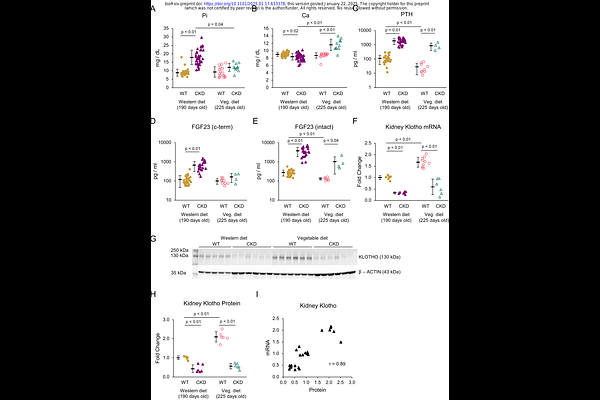The Impact of a Western Diet High in Phosphate on the CKD-MBD in an Alport Syndrome Model

The Impact of a Western Diet High in Phosphate on the CKD-MBD in an Alport Syndrome Model
Williams, M. J.; Patel, H. M.; Halling, C. B.; Hruska, K. A.
AbstractBackground: Chronic kidney disease - mineral bone disorder (CKD-MBD) is a syndrome that begins early in CKD, contributes to CKD-associated mortality, and includes components of FGF23 elevation, klotho deficiency, CKD-stimulated vascular disease, and renal osteodystrophy. Hyperphosphatemia, occurring in later stages of CKD, is also driven by mechanisms of CKD-MBD, and has been shown to stimulate vascular calcification. In a mouse model of Alport CKD that is resistant to vascular calcification, we examine the effects of a high-phosphate Western-type diet on the CKD-MBD, and test whether the diet promotes induction of vascular calcification. Methods: An X-linked Col4a5 deficient murine homolog of Alport Syndrome (CKD) and wild type (WT) littermates were fed an animal protein 1.2% high phosphate diet or a standard vegetable protein diet. At disease progression equivalent to CKD stage 4-5, we examined kidney histology for fibrosis, blood for BUN (marker of CKD), and markers of CKD-MBD disease progression, kidney tissue for klotho production, and aorta histology and tissue mRNA and protein analysis for vascular calcification. Results: The Western high Pi diet produced hyperphosphatemia in the CKD animals compared to WT and increased plasma PTH (1880 from 110 pg / ml), FGF23 c-term (670 from 120 pg / ml), and FGF23 intact (3780 from 280 pg / ml), and reduced kidney klotho mRNA and protein (57-67% reduction) (all p < 0.01). Referenced against the CKD animals fed vegetable-based diet, the Western high phosphate-fed CKD animals showed higher levels of plasma PTH and FGF23s. In the wild-type control mice with normal renal function, Western diet produced increased PTH, intact FGF23, and reduced renal klotho (all p <0.01). Vascular smooth muscle transdifferentiation and vascular calcification was not induced by Western high phosphate diet in this model of CKD. Conclusions: Our results show that a Western-style high-phosphate diet advances elements of the CKD-MBD. Renal klotho, FGF23 and PTH are affected by diet even with normal kidney function, suggesting a need for early intervention in the management of phosphate homeostasis as a component of CKD therapy. Additionally, CKD, klotho, and FGF23 all are associated with early aging. Therefore, our findings suggest that a Western high Pi diet accelerates aging and would contribute to the systemic complications of CKD - cardiac disease, osteodystrophy, and vascular disease.